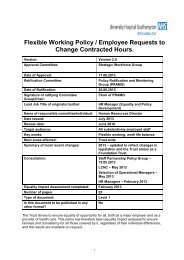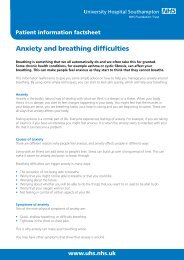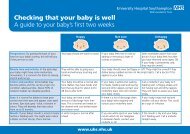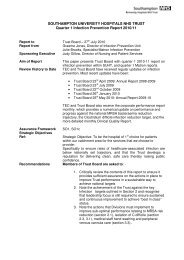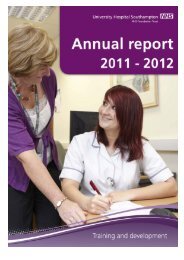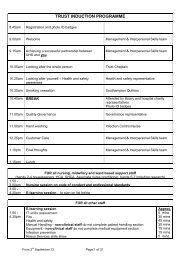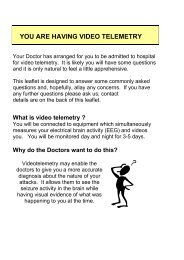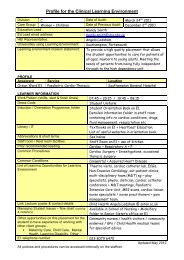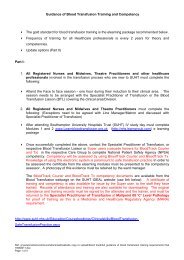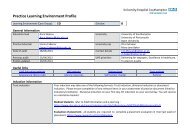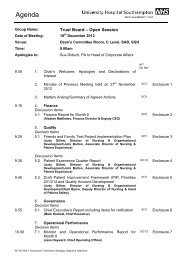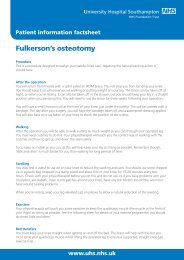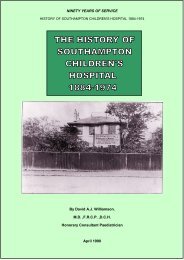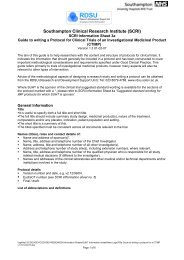Connect issue 30 - University Hospital Southampton NHS ...
Connect issue 30 - University Hospital Southampton NHS ...
Connect issue 30 - University Hospital Southampton NHS ...
Create successful ePaper yourself
Turn your PDF publications into a flip-book with our unique Google optimized e-Paper software.
Issue<br />
<strong>30</strong><br />
FREE - PLEASE TAKE ONE<br />
News from <strong>University</strong> <strong>Hospital</strong> <strong>Southampton</strong> <strong>NHS</strong> Foundation Trust<br />
Penny’s lifesaving<br />
decision<br />
Neonatal<br />
job is dream<br />
come true<br />
for Emily<br />
WIN!<br />
An<br />
iPod<br />
shuffle<br />
SPOTLIGHT<br />
ON MAJOR<br />
TRAUMA<br />
Aaron –<br />
survival<br />
against<br />
the odds
mediamonitor<br />
the latest UHS news<br />
Welcome to <strong>issue</strong><br />
<strong>30</strong> of <strong>Connect</strong><br />
In this <strong>issue</strong>...<br />
UHS in the news 2<br />
Op changes Vinny’s life 3<br />
Major trauma special 4/5<br />
Spouting off with Tim Underwood /<br />
Research a life saver for Penny 6<br />
Dream job for Emily 7<br />
Dear <strong>Connect</strong>/Fundraising connection 8<br />
Tell us what you think...<br />
Let us know what you think of <strong>Connect</strong>,<br />
plus tell us what news and features you’d<br />
like to see in future editions.<br />
Email connect@uhs.nhs.uk<br />
Write to Communications, Mailpoint 18<br />
<strong>Southampton</strong> General <strong>Hospital</strong><br />
Tremona Road, <strong>Southampton</strong> SO16 6YD<br />
Telephone 023 8079 4853<br />
Website www.uhs.nhs.uk<br />
<strong>Connect</strong> is produced by UHSFT’s<br />
communications team.<br />
Surgeons halve recovery time with<br />
pioneering knee repair operation<br />
Surgeons at <strong>Southampton</strong> General<br />
<strong>Hospital</strong> have pioneered an earlystage<br />
operation to repair damaged<br />
knees without the need for a total<br />
replacement – halving recovery times.<br />
The technique, known as<br />
bicompartmental knee resurfacing,<br />
involves replacing only the areas of<br />
cartilage affected by arthritis and<br />
avoids removal of the ligaments –<br />
enabling more natural movement<br />
immediately after surgery.<br />
Using resurfacing, only the ligament<br />
on the inside of the knee and the<br />
kneecap are affected when a surgeon<br />
removes sections of damaged cartilage<br />
and replaces it with plastic or alloy<br />
metal implants.<br />
The procedure sees patients leave<br />
hospital after three days – less than<br />
half the time it takes after total<br />
replacement – without crutches, which<br />
would be required<br />
for up to six<br />
weeks following<br />
full surgery.<br />
Professor David Barrett, a consultant<br />
orthopaedic surgeon and the first in<br />
the UK to perform the procedure,<br />
said: “While total replacements,<br />
which can last for up to 20 years, have<br />
always been and remain a suitable<br />
option for people over 65, they can<br />
wear out much faster in younger,<br />
more active patients but, until<br />
recently, there was no alternative<br />
for them.<br />
“Now, with increasing numbers of<br />
people in their 40s and 50s needing<br />
treatment, we are able to offer an<br />
alternative which extends the lifespan<br />
of their knee and allows them to<br />
make a quick return to daily and<br />
sporting activities.”<br />
MediaMonitor<br />
MediaMonitor<br />
The Trust is delighted to<br />
announce that children’s<br />
heart surgery will remain<br />
at <strong>Southampton</strong>. Thank<br />
you to everyone who<br />
supported us throughout<br />
the campaign.<br />
Revolutionary<br />
device to combat<br />
bladder problems<br />
Experts at Princess Anne <strong>Hospital</strong><br />
have pioneered the use of a<br />
device to help people overcome<br />
embarrassing bladder problems<br />
at the click of a button – without<br />
drugs, needles or surgery.<br />
The VERV system, which involves a<br />
small patch placed on the lower back<br />
and a remote control, is the first tool<br />
to halt the symptoms of overactive<br />
bladder (OAB) syndrome from outside<br />
the body via wireless technology.<br />
The condition causes sufferers to pass<br />
small amounts of urine before they can<br />
reach a toilet or feel a frequent and<br />
MediaMonitor MediaMonitor media monitor: This story was covered by The Daily Telegraph, The Sun, the Daily Express, the Daily Mail, The Herald (Scotland), the<br />
Health Service Journal, The Independent, the Birmingham Mail, the Northern Echo, the Eastern Daily Press, the Yorkshire Post, the Western<br />
Morning News, the Romsey Advertiser and the Southern Daily Echo.<br />
urgent desire to urinate.<br />
Using VERV, patients can send high<br />
frequency signals from the patch<br />
through the skin to stimulate the<br />
nerves at the base of the spine and<br />
control their bladder contractions.<br />
Consultant urogynaecologist<br />
Ash Monga, who worked on the<br />
development for eight years, said:<br />
“For the first time, patients have a<br />
non-surgical, drug-free, discreet and<br />
effective option which allows them<br />
to get their lives back without having<br />
to face an operating theatre or make<br />
regular trips for hospital treatment.”<br />
media monitor: This story was covered by the Daily Mail, The Independent, the<br />
Daily Mirror, the Chichester Observer, Crawley Observer, Shoreham Herald, the<br />
Portsmouth News, West Sussex County Times, the Sussex Express, the Petersfield<br />
Post and the Southern Daily Echo.<br />
MediaMonitor<br />
Doctor calls for screening<br />
programme to cut liver death rate<br />
A top doctor based at <strong>Southampton</strong>’s<br />
university hospitals is calling for the<br />
introduction of a national screening<br />
programme to cut the rising death<br />
rate from liver disease.<br />
Dr Mark Wright, a consultant<br />
hepatologist, spoke out following the<br />
unveiling of a hi-tech ultrasound probe<br />
to diagnose liver damage without the<br />
need for invasive biopsies and overnight<br />
hospital stays.<br />
The FibroScan, which uses sound<br />
waves to assess the degree of t<strong>issue</strong><br />
damage, takes around ten minutes<br />
to complete and gives specialists an<br />
immediate overview of a patient’s liver<br />
health through computerised images.<br />
“Deaths have increased by a quarter<br />
in less than a decade and we are sat<br />
on a triple ticking timebomb of the<br />
consequences of alcohol, obesity and<br />
hepatitis which, if we don’t intervene,<br />
MediaMonitor<br />
will send things spiralling out of<br />
control,” said Dr Wright.<br />
“With advances in technology,<br />
such as the FibroScan, we are in a<br />
better position than ever to tackle<br />
this crisis head-on as we can quickly<br />
and accurately assess people early on,<br />
without posing<br />
any risks to<br />
their health<br />
or requiring<br />
them to stay<br />
in hospital,<br />
then give<br />
them the<br />
support they<br />
need to fend<br />
off potential<br />
devastating<br />
threats<br />
to their<br />
health.”<br />
media monitor: This story was covered by The Independent, the Press Association,<br />
the Aberdeen Press and Journal, the Yorkshire Post, the Birmingham Mail, the South<br />
Wales Evening Post, Heart South Coast, Wave 105, Unity 101, Capital FM and Jack FM.<br />
2 CONNECT<br />
ISSUE <strong>30</strong><br />
When you have finished with this magazine please recycle it. Printed on environmentally friendly paper.
Her smile<br />
says it all<br />
This time last year, mum Esther Mullings had to<br />
watch helplessly as her son Vinny suffered painful<br />
spasms throughout his body.<br />
Left brain-damaged following a<br />
swimming pool accident, Vinny was<br />
constantly being sick and unable to<br />
enjoy anything.<br />
Now, after an operation to implant<br />
a special pump and catheter to slowly<br />
drip muscle relaxant directly into the<br />
youngster’s spinal cord, Vinny is painfree<br />
with a transformed quality of life.<br />
For Esther, husband Keith, an RAF<br />
sergeant, and older son Dennis, ten, it<br />
means they can finally start enjoying<br />
some time together as a family again.<br />
The new start is thanks to an operation<br />
carried out by consultant neurosurgeon<br />
Girish Vajramani at <strong>Southampton</strong><br />
General <strong>Hospital</strong>.<br />
Vinny, who turned five in May, now<br />
goes to a special school five days a week.<br />
Esther, 37, of Marchwood, near<br />
<strong>Southampton</strong>, said: “Vinny is a<br />
different boy.<br />
“He is so much more alert and loves<br />
his environment. He is just a joy.<br />
“We are not constantly standing over<br />
him and worrying. Having the operation<br />
has calmed him right down, and he is<br />
finally in a routine of being awake in the<br />
day and sleeping at night.”<br />
She added: “The best thing is that<br />
he no longer spasms unless he is ill or<br />
very tired. The spasms were extremely<br />
distressing and made him hot and dizzy.”<br />
Vinny was two when he nearly<br />
drowned in a friend’s swimming pool<br />
in Cyprus, where the forces family were<br />
based at the time.<br />
Emergency resuscitation<br />
was carried out at the scene before<br />
the toddler was rushed to hospital in<br />
Limassol, where he spent two days in a<br />
drug-induced coma.<br />
A specialist team from <strong>Southampton</strong>’s<br />
paediatric intensive care unit (PICU)<br />
flew out to the holiday island to bring<br />
him home.<br />
Esther said: “The Cypriots were<br />
communicating with the neurological<br />
doctors back in the UK and told us<br />
<strong>Southampton</strong> was top-notch for<br />
treatment and after-care.<br />
“That reassured me and a plane<br />
was organised for us to fly into<br />
Bournemouth. Vinny was blue-lighted all<br />
the way to PICU.”<br />
Vinny had suffered a severe brain<br />
injury through oxygen starvation in<br />
the accident.<br />
Scans and tests subsequently confirmed<br />
he had dystonia – uncontrollable and<br />
often painful muscle spasms caused<br />
by incorrect signals from the brain.<br />
Although no cure, the condition can<br />
be controlled.<br />
Vinny spent two-and-a-half months in<br />
intensive care before transferring to the<br />
high dependency unit and eventually a<br />
side room.<br />
Many difficult months went past in a<br />
blur of spasms, drugs, sickness, feeding<br />
challenges and a bout of pneumonia.<br />
“I am a military wife and thought I<br />
was tough, but it was a terrible, terrible<br />
time,” said Esther.<br />
“Vinny was constantly ill or crying, and<br />
I felt useless; I didn’t feel like a mum.<br />
“He couldn’t see or hear well and<br />
we were told his brain was busy<br />
re-programming itself.”<br />
Eventually, Vinny was well enough<br />
to be discharged and the family set<br />
up home in Chilworth, <strong>Southampton</strong>,<br />
where community nurses helped with his<br />
rehabilitation.<br />
Vinny’s consultant, Professor Colin<br />
Kennedy, began talking to the family<br />
about intrathecal baclofen therapy (ITB)<br />
to help reduce stiffness in his body.<br />
“We were all holding our breath<br />
as Vinny started looking around<br />
the room and held his head up by<br />
himself for the first time.”<br />
ITB is a system of administering muscle<br />
relaxant directly into the spinal cord via a<br />
pump and catheter.<br />
In November 2011, Vinny underwent<br />
the procedure at the hands of Mr<br />
Vajramani.<br />
A pump the size of a hockey puck was<br />
implanted into Vinny’s abdomen, with<br />
an attached catheter leading directly into<br />
his spinal canal.<br />
A computer was used to programme<br />
the pump to ensure it delivered the<br />
correct dosage to keep Vinny’s spasms<br />
under control.<br />
Eight hours after the operation, a<br />
physiotherapist sat Vinny up – and the<br />
results left his family stunned.<br />
“It was amazing,” said Esther.<br />
“We were all holding our breath as<br />
Vinny started looking around the room<br />
and held his head up by himself for the<br />
first time.”<br />
Although Vinny remains short-sighted,<br />
his hearing is 100%. He says “mum” and<br />
communicates yes and no by blinking.<br />
Now Vinny returns to hospital every<br />
few months to have his pump topped<br />
up with medication.<br />
Esther said she and Keith, 41, would be<br />
forever indebted to the doctors, nurses,<br />
physiotherapists and other staff who had<br />
helped Vinny.<br />
“I cannot even begin to express our<br />
gratitude to the team at <strong>Southampton</strong><br />
General <strong>Hospital</strong>,” said Esther.<br />
“Everyone we have met has been<br />
absolutely amazing. They have always<br />
reassured us and spoken to us in just the<br />
right way.<br />
“Vinny is always going forward now<br />
and we are so grateful for that.”<br />
Professor Kennedy said: “In spite of the<br />
severe difficulties Vinny has with stiffness<br />
and co-ordination of movement, it has<br />
always been easy to know whether<br />
he is happy or, on the other hand,<br />
uncomfortable.<br />
“We have thought for a long time<br />
that he would benefit from this unusual<br />
special treatment using the implanted<br />
pump and it is a real delight to see now<br />
the difference it makes to him written all<br />
over his face.”<br />
CONNECT<br />
ISSUE <strong>30</strong>3
MAJOR<br />
TRAUMA<br />
Aaron’s<br />
timeless<br />
tribute<br />
It was the ultimate way of<br />
showing his gratitude.<br />
Cyclist Aaron Denham had survived<br />
against all odds following a horrific<br />
road crash in which his neck not only<br />
broke but detached from his skull.<br />
And just weeks after leaving<br />
hospital, the plucky 22-year-old<br />
underwent the needle again – at the<br />
hands of a tattoo artist.<br />
Aaron, from Fair Oak near<br />
<strong>Southampton</strong>, wanted a permanent<br />
reminder of the woman who saved his<br />
life as he lay in agony on the roadside.<br />
Now not a day passes without<br />
questions about Maria and 11 March<br />
2011 – the name and date indelibly<br />
inked under a halo on his skin.<br />
“Whenever someone asks me about<br />
the tattoo, I tell them this woman<br />
saved my life,” said Aaron, a<br />
carpenter. “It’s the only way I could<br />
think of showing my appreciation.<br />
“Every time I look in the mirror,<br />
I’m reminded how it feels to have<br />
someone around who I owe my<br />
life to.”<br />
That woman is former nurse Maria<br />
Brasseur, 47, who had been<br />
pottering at her allotment when<br />
Aaron was knocked off his bike on<br />
the busy Highbridge Road near<br />
Colden Common.<br />
“I just heard this horrendous bang<br />
which sounded like a mass pile-up, so<br />
I shot across the allotment and<br />
clambered over an eight-foot fence,<br />
though how I did that still amazes<br />
me,” said Maria, from Bitterne,<br />
<strong>Southampton</strong>.<br />
“I found this young man trying to<br />
lift his head up, so I forced him back<br />
to the ground and wrapped my body<br />
around his so he couldn’t move – I<br />
had a foot in his back, knee between<br />
his shoulders and my arms keeping<br />
I knew I didn’t want to be in a<br />
wheelchair… She gave me the fight to<br />
succeed, to return to how I was before.”<br />
him warm and pinned.”<br />
Her decision to hold Aaron<br />
prevented permanent spinal damage,<br />
though the combination and extent<br />
of his injuries left everyone involved,<br />
including the most experienced<br />
medics, fearing the worst.<br />
The young carpenter had sustained<br />
serious head injuries, broken his<br />
neck, pelvis, ribs, wrist and nose,<br />
severed one of the main arteries in<br />
his neck, lacerated his spleen, bruised<br />
his spinal cord and suffered a<br />
punctured lung.<br />
Aaron was airlifted to <strong>Southampton</strong><br />
General <strong>Hospital</strong>’s specialist<br />
neurosciences intensive care unit and<br />
put in a medically-induced coma, but<br />
his mum Debbie, 48, and sister<br />
Leanne, 23, were told his chance of<br />
survival was slim.<br />
In a dramatic twist after five nights<br />
on life support, a slight twitch of the<br />
hand marked the start of a<br />
remarkable recovery that has<br />
astounded doctors.<br />
Mother-of-four Maria had heard<br />
nothing more about Aaron other<br />
than a phone call from the police the<br />
day after the accident.<br />
She said: “Every day I went to the<br />
allotment, I just waited to see<br />
flowers because you need a bit of<br />
closure, but the flowers never came.”<br />
Then, two months after the<br />
accident, she received a call to say<br />
Aaron had been told about her and<br />
wanted to meet.<br />
Maria and husband Luc travelled to<br />
Aaron’s rehabilitation centre in<br />
Salisbury where she was to have a<br />
second major impact.<br />
Aaron said: “When I met Maria I<br />
knew I had to get better and keep<br />
working hard because this woman<br />
went to all that trouble to save me<br />
and I didn’t want her doing that for<br />
no reason.<br />
“I knew I didn’t want to be in a<br />
wheelchair, I wanted to get on with<br />
it, get out of hospital and get out of<br />
rehabilitation. She gave me the<br />
fight to succeed, to return to how<br />
I was before.”<br />
FLIGHT<br />
STATS<br />
200<br />
Nearly 200 emergency flights have<br />
used <strong>Southampton</strong> General<br />
<strong>Hospital</strong>’s helipad during<br />
its first eight months of operation.<br />
197<br />
Between November and the end of<br />
June there were a total of 197<br />
landings – an average of one a day.<br />
Of these, 20 were out of hours<br />
(between 6pm and 8am).<br />
9<br />
The flights involved nine different<br />
helicopter services, including<br />
Hampshire and Isle of Wight Air<br />
Ambulance, the police, coastguard<br />
and RAF. Furthest afield was from<br />
Devon, for a patient who needed<br />
emergency neurosurgery.<br />
CONNECT<br />
4 ISSUE <strong>30</strong>
MAJOR<br />
TRAUMA<br />
Trauma centre<br />
‘most exciting’<br />
development<br />
Many more<br />
patients like Aaron<br />
will benefit from<br />
immediate access to<br />
specialist treatment<br />
following the launch<br />
of a nationwide<br />
major trauma system<br />
in England.<br />
And that determination<br />
shone through.<br />
Just three months after being<br />
rushed to hospital, Aaron took his<br />
first steps. By September he was<br />
discharged.<br />
“If Maria hadn’t done what she<br />
did, I’d either be dead or paralysed,”<br />
he said.<br />
“Where I broke my neck so badly<br />
and was moving so much, any one of<br />
the broken bones in<br />
my neck could have<br />
cut my spinal cord.”<br />
He added: “I get lots<br />
of people asking me if<br />
this tattoo is the<br />
name of my girlfriend<br />
but I tell them it’s my<br />
second mum.<br />
“I let them know I<br />
was at death’s door<br />
and this woman saved<br />
my life and I want<br />
everyone I meet to<br />
know my story.”<br />
Dr Andy Eynon,<br />
Aaron’s neck tattoo<br />
170<br />
The distance from helipad to<br />
emergency department is just 170<br />
metres, the shortest journey of its<br />
kind in the south of England.<br />
director of major trauma, said:<br />
“When I saw Aaron in the<br />
emergency department I didn’t think<br />
he’d make it – if he didn’t die he was<br />
likely to be paralysed from the neck<br />
down as his head had dislocated<br />
from his neck by over a centimetre.<br />
“He beat the odds just to survive, but<br />
to go on and recover as strongly and<br />
as quickly as he has is remarkable.”<br />
Dr Andy Eynon, director of<br />
major trauma at UHS, believes<br />
the development, which sees<br />
the creation of 22 major<br />
trauma centres, is one of the<br />
“most exciting in the <strong>NHS</strong> for<br />
a generation”.<br />
<strong>Southampton</strong> is one of only<br />
12 recognised for the<br />
treatment of both adults and<br />
children and expects to see the<br />
number of major trauma cases<br />
rise from 400 to 600 per year.<br />
More than half of all major<br />
trauma – the term used to<br />
describe life-threatening<br />
injuries commonly sustained<br />
through road traffic accidents,<br />
falls, violence or sporting<br />
injuries – happens on the road<br />
and it is twice as common in<br />
urban areas than rural parts of<br />
the country.<br />
Patients may now bypass<br />
their local hospital and instead<br />
go directly to <strong>Southampton</strong> if<br />
their injury occurs within a<br />
45-minute drive.<br />
Those injured further afield<br />
are taken to their nearest<br />
trauma unit and assessed and<br />
resuscitated before being<br />
rapidly transferred if their<br />
injuries require specialist<br />
intervention.<br />
Dr Eynon said: “The<br />
development of this network<br />
and those across England gives<br />
patients the best chance of<br />
surviving and recovering from<br />
major trauma due to<br />
immediate access to the right<br />
professionals, teams and<br />
equipment at anytime of the<br />
day or night – the benefits of<br />
going direct to a hospital that<br />
can provide all the necessary<br />
care hugely outweigh the risk<br />
of the additional drive time.”<br />
CONNECT<br />
ISSUE <strong>30</strong>5
Spouting<br />
off with…<br />
Tim Underwood<br />
Imagine working in a hospital with a<br />
catchment of 200 million people. Picture<br />
consultations based on CT scans alone,<br />
that take place with relatives rather than<br />
the patient themselves, in the knowledge<br />
that the same CT scans will be taken to<br />
doctors across town until the family get<br />
the opinion that they want.<br />
Oh, and to make things worse, you<br />
will be expected to see 50 patients (or<br />
their relatives) in two and a half hours.<br />
And don’t expect to see one family at<br />
a time, oh no, you will be expected<br />
to perform four or five consultations<br />
simultaneously in the same room…<br />
so much for confidentiality!<br />
Envisage being a surgeon in a society<br />
that believes an operation is the only<br />
treatment for cancer…at any cost. And<br />
what if you knew that to prevent a<br />
violent attack by a patient’s relatives you<br />
had to take the specimen into the waiting<br />
room to prove what you had done.<br />
Despite little standing in society you will<br />
at least be treated with respect by your<br />
work colleagues.<br />
As chief of service you will have the<br />
power to make changes without the<br />
endless paperwork of the <strong>NHS</strong>. The<br />
hospital will invest properly in research,<br />
with a $3 million t<strong>issue</strong> bank providing<br />
two dedicated theatre staff and two<br />
floors of laboratory space.<br />
Junior doctors don’t worry about hours<br />
and work tirelessly producing paper<br />
after paper with no fuss or moaning.<br />
You don’t have to worry about ethics<br />
committees, and clinical trials can<br />
be completed easily when you are<br />
performing 650 oesophagectomies a<br />
year (a surgeon in the UK will perform a<br />
maximum of 75).<br />
If this sounds like your bag, get yourself<br />
to Shanghai, a booming mega-city<br />
where old China has crashed head-long<br />
into unchecked US style capitalism with<br />
spectacular results.<br />
Tim Underwood,<br />
MRC clinician<br />
scientist<br />
specialising<br />
in upper<br />
gastrointestinal<br />
surgery, has<br />
recently visited Fudan<br />
<strong>University</strong> cancer centre in<br />
Shanghai.<br />
For more information, go to<br />
www.southampton.ac.uk/<br />
medicine/about/staff/tju.page<br />
If you have a burning <strong>issue</strong> you’d like to get<br />
off your chest, email connect@uhs.nhs.uk<br />
Research study proved<br />
life-saver for Penny<br />
Agreeing to be part of a research project was<br />
probably the best decision Penny Powell ever made.<br />
When the 67-year-old respiratory<br />
patient signed up for the study, she<br />
had no idea it would end up saving<br />
her life.<br />
For when the former nanny failed<br />
to turn up for her appointment at<br />
<strong>Southampton</strong> General <strong>Hospital</strong>, it<br />
was the research team who raised<br />
the alarm and asked police to break<br />
into her home.<br />
Officers found Penny, who suffers<br />
from chronic obstructive pulmonary<br />
…I will be forever<br />
grateful to the<br />
research team for<br />
the lengths they<br />
went to for me.<br />
disease (COPD), unconscious in<br />
bed at her home in Portswood,<br />
<strong>Southampton</strong>, and arranged for<br />
her to be rushed to the emergency<br />
department by ambulance.<br />
The mother-of-four was in a<br />
critical condition and doctors were<br />
concerned she would never wake<br />
from an induced coma.<br />
If she did, they expected her to<br />
have suffered significant brain<br />
damage as her oxygen supply had<br />
been so compromised.<br />
With the prognosis looking grim,<br />
Penny’s daughter, Philippa, 27,<br />
called her three brothers and told<br />
them to hurry to hospital as quickly<br />
as they could.<br />
But Penny, who has also worked<br />
as a landlady, postmistress, bookkeeper<br />
and charity shop volunteer,<br />
took everyone by surprise.<br />
Philippa, from Lymington, said:<br />
“I thought we might have to say<br />
goodbye to mum and was worried<br />
the boys might not make it in time<br />
but, out of nowhere, she sat bolt<br />
upright in the bed – even the doctor<br />
jumped a mile!”<br />
Penny spent 17 days in the high<br />
dependency unit but, remarkably,<br />
suffered no long-term damage.<br />
Now in a new warden-assisted<br />
home near her daughter, Penny says<br />
she will be forever indebted to the<br />
respiratory biomedical research unit<br />
team who raised the alarm.<br />
“By the time anybody had got to<br />
me at home, I think it would have<br />
been too late – if I hadn’t been on<br />
the study then I wouldn’t be here<br />
today,” she said.<br />
“The fact they knew so much<br />
about my history and had such an<br />
interest in my condition and health<br />
also played a major part in the time<br />
invested in me. I will be forever<br />
grateful to the research team for<br />
the lengths they went to.”<br />
Penny, who was diagnosed with<br />
COPD more than five years ago, had<br />
been asked to join a pioneering<br />
WHAT IS COPD?<br />
Chronic obstructive pulmonary<br />
disease (COPD) is the name<br />
given to a collection of lung<br />
diseases, including bronchitis<br />
and emphysema, which cause<br />
the airways to become inflamed<br />
and narrowed, making it hard<br />
for sufferers to breathe.<br />
Penny with Lindsay Welch, senior<br />
respiratory research nurse<br />
study to discover which bacteria<br />
and viruses cause a worsening<br />
of symptoms.<br />
As part of the research, Penny had<br />
to keep an electronic diary of how<br />
she felt every morning and evening<br />
and, if she felt her condition<br />
deteriorate, would call the research<br />
team to book an appointment.<br />
Because her breathing had become<br />
restricted and her energy levels<br />
had dropped, she had made an<br />
appointment with the researchers<br />
on a Monday morning.<br />
When she failed to turn up, the<br />
team didn’t assume she had forgotten<br />
and made every effort to contact<br />
her, also trying her sister, GP surgery,<br />
community nurses and pharmacist to<br />
see if anyone had seen her.<br />
After all enquiries drew a blank,<br />
they called the police and asked<br />
them to break in to her home.<br />
Dr Simon Bourne, respiratory<br />
consultant and study lead, said:<br />
“Penny was admitted with septic<br />
shock and was immediately<br />
transferred to resus.<br />
“If she’d been left any longer she<br />
would have almost certainly died<br />
at home. The team performed a<br />
fantastic job in chasing this up and<br />
without a doubt saved her life<br />
through their quick thinking.”<br />
CONNECT<br />
6 ISSUE <strong>30</strong>
A dream<br />
come true<br />
For most of us, childhood dreams<br />
never come true.<br />
But not so for Emily Boylett, who has<br />
fulfilled her lifelong ambition to care<br />
for some of the smallest babies at<br />
the hospital where her life began 21<br />
years ago.<br />
Born extremely sick and premature<br />
at 24 weeks, weighing only 1lb 11 oz,<br />
she spent more than 100 days in the<br />
neonatal unit at <strong>Southampton</strong>’s<br />
Princess Anne <strong>Hospital</strong>.<br />
And, from the moment she was able<br />
to understand what happened in<br />
the first year of her life, it has been<br />
Emily’s dream to work in the unit that<br />
saved her life and make a difference.<br />
“Even if it meant starting at the<br />
bottom, I wanted<br />
to work in this<br />
department and show<br />
my appreciation to<br />
all the staff who had<br />
helped my mum and<br />
I all those years ago,”<br />
she explained.<br />
On completing a<br />
childcare course, she<br />
applied for a senior<br />
healthcare assistant role<br />
and was interviewed by the night nurse<br />
who cared for her, Carol Woolridge,<br />
now the neonatal team matron.<br />
“This is such a lovely<br />
story with the perfect ending,” said<br />
Carol. “I remembered Emily from all<br />
those years ago as she was with us<br />
for such a long time and it was very<br />
Emily with matron Carol Woolridge<br />
much touch and go.<br />
“To see her working on the unit is<br />
just amazing – it’s a dream come true<br />
for all of us.”<br />
Emily at 24 weeks<br />
CONNECT<br />
ISSUE <strong>30</strong>7
dear<br />
connect<br />
i<br />
Find out more... Sign up to <strong>Southampton</strong> <strong>Hospital</strong> Charity’s newsletter to receive<br />
more news and fundraising information. Email charity@uhs.nhs.uk<br />
After supper<br />
one evening<br />
in June<br />
2010, I<br />
collapsed<br />
in my<br />
bedroom.<br />
My wife called the <strong>NHS</strong><br />
helpline and paramedics arrived<br />
within ten minutes, summoned<br />
an ambulance and I was in<br />
the emergency department at<br />
<strong>Southampton</strong> General 20<br />
minutes later.<br />
The medical teams found that I<br />
had a major bowel obstruction, the<br />
cause being a blood clot blocking the<br />
blood supply to the small intestine.<br />
The situation was serious. During<br />
the first operation, surgeons<br />
discovered gangrene had developed<br />
and, in the following days, I<br />
underwent four major operations<br />
which saw the removal of 1.5 metres<br />
of intestine.<br />
I spent some time in intensive<br />
care before moving to the high<br />
dependency unit and finally E8.<br />
I was fed using a line in my chest<br />
with a system called total parental<br />
nutrition (TPN), where food is<br />
prepared in a liquid form in the<br />
laboratory and fed into the body for<br />
periods of 12 to 24 hours daily.<br />
I ate no food for the next eight<br />
months and recovery was slow –<br />
but positive.<br />
I was discharged in December<br />
but remained on TPN at home. My<br />
bedroom was transformed into a<br />
mini-ward, with medical supplies, a<br />
fridge containing the bagged food<br />
and twice-daily nursing visits.<br />
Four months later, I had recovered<br />
enough to face reconstructive<br />
surgery which involved the<br />
reconnection of the intestines and<br />
the removal of the stoma tube, after<br />
which I was able to eat normal food.<br />
Initially meals were small and soft,<br />
since my bowels had to wake up<br />
after a nine month “sleep”.<br />
I have now regained much of my<br />
body weight and I exercise daily,<br />
garden, fish, walk in the forest and<br />
even play some golf.<br />
My story is a miracle and I now<br />
know it is a reflection of what is<br />
achieved daily by our <strong>NHS</strong> and, in<br />
this case, <strong>Southampton</strong> General<br />
<strong>Hospital</strong>.<br />
The immediate on-call response,<br />
the hospital’s actions in ED and<br />
the skill and professionalism of the<br />
medical, surgical and nutritional<br />
teams saved my life, while the<br />
ongoing support I continue to<br />
receive from the chaplaincy is<br />
exceptional.<br />
A magnificent team at all levels.<br />
The fundraising<br />
connection<br />
Call <strong>Southampton</strong> <strong>Hospital</strong> Charity on 023 8079 8881 or visit www.uhs.nhs.uk/charity<br />
Delivery of life-saving<br />
vehicles to Ghana<br />
They may not be<br />
your usual looking<br />
ambulances, but two<br />
Nissan patrol cars are<br />
changing the lives of<br />
many people across<br />
the upper east region<br />
of Ghana.<br />
Photo © Dave Brown 2012<br />
Sudoku challenge<br />
Win an iPod shuffle<br />
A team from the Trust, led by<br />
consultant anaesthetist Malvena<br />
Stuart-Taylor and former <strong>NHS</strong><br />
manager Nick Eastcott, raised money<br />
for the life-saving vehicles through<br />
charity Afrikids and delivered them<br />
in person to the Bolgatanga<br />
hospital in Ghana during a 5,000-<br />
mile road trip.<br />
After three weeks struggling<br />
with breakdowns, heat exhaustion<br />
and even a military coup in Mali,<br />
the team made it to an amazing<br />
welcome from the people of Ghana.<br />
Dr Stuart-Taylor said: “I have<br />
volunteered at medical centres<br />
across Ghana on many occasions and,<br />
WIN!<br />
Enter numbers from 1 to 9 into the blank squares, so that<br />
every row, every column and every 3x3 square has one of each digit.<br />
Send your entry in the post to <strong>Connect</strong>, Mailpoint 18, <strong>Southampton</strong><br />
General <strong>Hospital</strong>, Tremona Road, SO16 6YD to be in with a chance of<br />
winning a 2GB iPod shuffle donated by Shelbourne Senior Living.<br />
Entries close 14 September 2012.<br />
Congratulations to Mrs M Oliver who<br />
won the Sudoku challenge in <strong>issue</strong> 29.<br />
although we are making a difference<br />
in terms of the care we are providing<br />
at central hospitals, we have<br />
observed a massive problem in terms<br />
of people who are very ill actually<br />
getting to hospital.<br />
“Although care is available, patients<br />
are dying before they make it to<br />
hospital so in collaboration with the<br />
Ghana Health Service, Afrikids and<br />
UHS, we have for the last year been<br />
organising the delivery of these much<br />
needed vehicles that will cover a<br />
region the size of Wales and support<br />
seven hospitals.<br />
“Mobile telecommunications signal<br />
is surprisingly good in the area so we<br />
look forward to these ambulances<br />
making an immediate impact on<br />
outcomes for patients as they get to<br />
hospital much quicker.”<br />
The ambulance numbers in the area<br />
have tripled with their arrival and it<br />
was the local Ghanaians who advised<br />
that 4X4 Nissan patrol cars would be<br />
the most appropriate for the region.<br />
If you would like to support<br />
projects like this, go to<br />
www.gaspartnership.org for<br />
further information or donate<br />
directly at www.justgiving.com/<br />
Ambulances-to-Africa<br />
Alan Swan, 73<br />
Hythe



